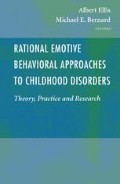Access this chapter
Tax calculation will be finalised at checkout
Purchases are for personal use only
Preview
Unable to display preview. Download preview PDF.
References
Bernard, M.E., and DiGiuseppe, R. (eds.) (1994). Rational-emotive consultation in applied settings. Hillsdale, New Jersey: Lawrence Erlbaum.
Bernard, M.E., and Joyce, M.R., (1984). Rational Emotive Therapy with children and adolescents: Theory, treatment strategies, preventive methods. New York: Wiley and Sons.
Borcherdt, B. (1996). Making families work and what to do when they don’t. Thirty guides for imperfect parents of imperfect children. New York: The Haworth Press.
Bowlby, J. (1988). A secure base: Parent-child attachment and healthy human development. New York: Basic Books.
Cox, B.T., Borger, S.C., Taylor, S., Fuentes, K., and Ross, L.M. (1999). Anxiety sensitivity and the five factor model of personality. Behavior Research and Therapy, 37, 633–641.
David, D., Montgomery, G.H., Macavei, B., Bovbjerg, D.H. (2005). An empirical investigation of Albert Ellis’s binary model of distress. Journal of Clinical Psychology, 61(4), 499–516.
Dukes, A., Mellor, D., Flory, V., Moore, K. (2003). A preliminary investigation of the relationship between parental empathy and social anxiety and children’s social anxiety. Proceedings of the 3rd Australasian Psychology of Relationships Conference, 33–39.
Eisenberg, N., Zhou, Q., Losoya, S.H., Fabes, R.A., Shepard, S.A., Murphy, B.C., Reiser, M., Guthrie, I.K., and Cumberland, A. (2002). The relationships of parenting, effortful control, and ego control to children’s emotional expressivity. Child Development, 74(3), 875–95.
Ellis, A. (2002). Integrating other psychotherapies with REBT. New York: Albert Ellis Institute Newsletter.
Ellis, A. (2003). A new cognitive-behavioral construct Part II. Journal of Rational-Emotive and Cognitive Behavior Therapy. 21(3–4), 193–202.
Ellis, A., Wolfe, J. H., and Moseley, S. (1966). How to raise an emotionally healthy, happy child. New York: Crown; and Hollywood: Wilshire Books.
Flett, G.L., Greene, A., and Hewitt, P.L. (2004). Dimensions of perfectionism and anxiety sensitivity. Journal of Rational-Emotive and Cognitive Behavior Therapy, 22(1), 39–57.
Flory, V. (2004). A novel intervention for severe childhood depression and anxiety. Clinical Child Psychology and Psychiatry, 9(1), 9–23.
Flory, V. (2005). Your child’s emotional needs. What they are and how to meet them. Sydney: Finch Publishing.
Gottman, J. and DeClaire, J. (1997). The heart of parenting. How to raise an emotionally intelligent child. London: Bloomsbury.
Gottman, J., Katz, L., and Hooven, C. (1996). Meta-emotion: How families communicate emotionally, links to child peer relations and other developmental outcomes. Mahwah, N.J.: Lawrence Erlbaum.
Hauck, P. (1967). The rational management of children. New York: Libra Publishers.
Hauck, P. (1983) Working with parents. In A. Ellis and M.E. Bernard (eds.), Rational-Emotive approaches to the problems of childhood. New York: Plenum Press, pp. 333–366.
Joyce, M.R. (1994). Rational-emotive parent consultation. In M.E. Bernard and R. DiGiuseppe (eds.), Rational-emotive consultation in applied settings. Hillsdale, New Jersey: Lawrence Erlbaum.
Joyce, M.R. (1990). Rational-emotive parent consultation. School Psychology Review, 19(3), 304–314.
Kegan, R. (1982). The evolving self. Problem and process in human development. Cambridge, Mass.: Harvard University Press.
Kegan, R. (1995). In over our heads. The mental demands of modern life. Cambridge, Mass: Harvard University Press.
Meyers, J, Parsons, R.D. and Martin, R. (1979). Mental health consultation in the schools. San Francisco: Jossey Bass.
Patterson, G.R. and Dishion, T.J. (1985). Contributions of families and peers to delinquency. Criminology, 23, 63–79.
Serbin, L., and Karp, J. (2003). Intergenerational studies of parenting and the transfer of risk from parent to child. Current Directions in Psychological Science, 12(4), 138–142.
Woulff, N. (1983). Involving the family in the treatment of the child. A model for Rational-Emotive therapists. In A. Ellis and M.E. Bernard (eds.) Rational-Emotive approaches to the problems of childhood. New York: Plenum Press, pp. 367–385.
Author information
Authors and Affiliations
Editor information
Editors and Affiliations
Rights and permissions
Copyright information
© 2006 Springer Science+Business Media, Inc.
About this chapter
Cite this chapter
Joyce, M.R. (2006). A Developmental, Rational-Emotive Behavioral Approach for Working with Parents. In: Ellis, A., Bernard, M.E. (eds) Rational Emotive Behavioral Approaches to Childhood Disorders. Springer, Boston, MA. https://doi.org/10.1007/0-387-26375-6_6
Download citation
DOI: https://doi.org/10.1007/0-387-26375-6_6
Publisher Name: Springer, Boston, MA
Print ISBN: 978-0-387-26374-8
Online ISBN: 978-0-387-26375-5
eBook Packages: Behavioral ScienceBehavioral Science and Psychology (R0)

